Seabird conservationists perplexed by discoveries on Mullion island work out depressing explanation. This corresponds to findings shown in the recent Blue Planet series and increasingly, in bird populations around the world, including the islands near my home in Wales.
Original article by Steven Morris @stevenmorris20
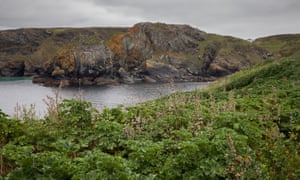
There isn’t a lot to Mullion island, a jagged outcrop of volcanic rock that rises out of a crystal-clear sea just off the Cornish coast. Nobody lives on the island and visitors need a permit to land.
So when conservationists who occasionally paddle across on kayaks to carry out seabird surveys began spotting brightly coloured elastic bands – thousands of them – there was a little bit of head-scratching.
Had they washed ashore from a wreck or could it be that someone was playing a practical joke? Might they have been to do with the film crew that once shot an Agatha Christie adaptation there?
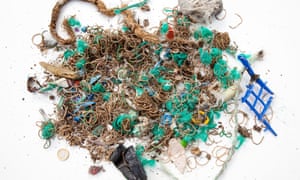
But the mystery of Mullion island turned out to be unromantic and upsetting.
Ornithologists from the West Cornwall Ringing Group and the National Trust have revealed that they believe the elastic bands have been brought to the island by seabirds mistaking them for worms while searching for food on the mainland.
The thought is that great black-backed and herring gulls had come across the bands in flower fields, gobbled them up and returned to the island. The bands had then been regurgitated by the birds on the island.
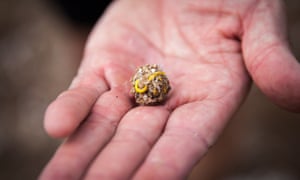
“It’s a bit depressing, a sign of the times” said Mark Grantham, from the West Cornwall Ringing Group. “It’s a beautiful place and people rarely go there but it shows how humans have an impact everywhere.”
Grantham said the group had been paddling across to count the birds since 2013 and had begun to notice the colourful bands. To avoid disturbing the birds, they usually kept their trips short and so did not realise just how many bands were there.
After this year’s breeding season, though, the group decided to paddle over and take a closer look.
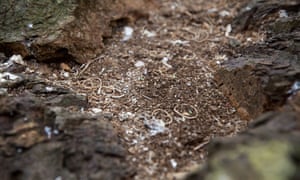
“We were puzzled why there were so many and how they’d got there,” said Grantham. “To save disturbing the nesting birds, we made a special trip over to clear the litter. Within an hour we’d collected thousands of bands and handfuls of fishing waste.
“The gull breeding season was disappointingly poor in 2019. These human pressures are doing nothing to help our seabirds.”
Some of the bands were new and bright, others faded and brittle. Grantham said he thought the birds had been collecting them for decades.
As well as the bands, small bundles of green fishing net and twine were also uncovered among the undigested food, likely mistaken by the gulls for tasty morsels floating on the sea surface. They also found a dead gull with a fishing hook it its gullet.
Rachel Holder, area ranger for the National Trust, said: “Ingested plastic and rubber is another factor in a long list of challenges which our gulls and other seabirds must contend with just to survive.
“Despite being noisy and boisterous and seemingly common, gulls are on the decline. They’re already struggling with changes to fish populations and disturbance to nesting sites – and eating elastic bands and fishing waste does nothing to ease their plight.
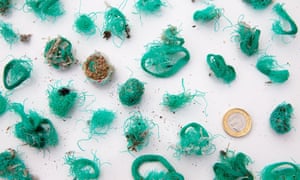
“Places like Mullion island should be sanctuaries for our seabirds, so it’s distressing to see them become victims of human activity.”
Sitting half a mile off the coast of the Lizard peninsula in south Cornwall, Mullion island is a two-hectare outpost made up of volcanic pillow lava. Before the first world war, pilchard companies posted sentries on the island to look out for the dark patches in the sea that indicated shoals of fish.
Now the island is home to one of the largest colonies of great black-backed gulls in Cornwall, with up to 70 nests each summer, plus 50 cormorant nests.
Landing is prohibited except for researchers with permission. Ornithologists from West Cornwall Ringing Group visit to monitor the populations of gulls and cormorants, and to colour-ring their chicks to follow their movements.
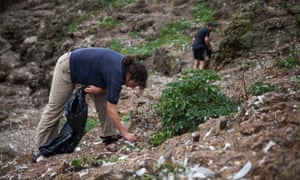
The elastic bands are believed to have come from nearby horticultural fields, where they are used to tie together bunches of cut flowers. The trust is calling on businesses to consider how they dispose of materials that could cause harm to wildlife.
Lizzy Carlyle, the head of environmental practices at the National Trust, said: “Single-use materials are having an alarming impact on our country’s most remote places. It’s up to all of us to take responsibility for how we use and dispose of these items – whether we’re producers or consumers.”
Gull populations are on the decline, with the herring gull – the species notorious for pinching food from unassuming tourists – appearing on the UK Red List of Birds of Conservation Concern.
